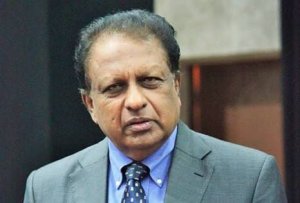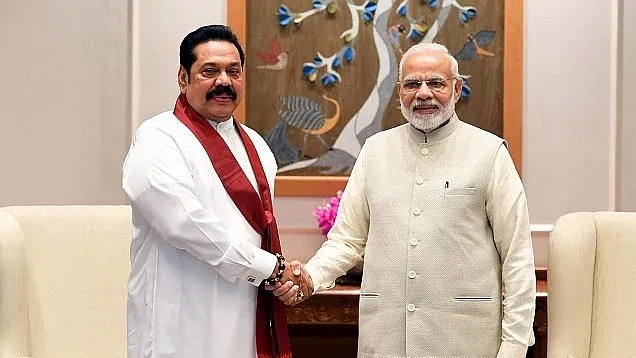
Sri Lanka Offers Friendship, But Firm On China & Tamils
The advent of Gotabaya Rajapaksa as President and Mahinda Rajapaksa as Prime Minister did not augur well for India-Sri Lanka relations. Both of them had taken their country to the Chinese camp and their successors were not able to restore balance in their relations with their giant neighbours as the impact of the Rajapaksas was too profound in the island’s strategy for anyone to change course.
They were also unable to change the victors’ justice to the decimated Tamil population despite India’s sincere efforts to coerce the Sri Lankan government to honour its commitment to the Tamil population. The tactic used was to declare equality for all Sri Lankans, thus eliminating any need for autonomy for the Tamils through the thirteenth Amendment. Both the brothers, during their recent visits to India pledged cooperation with India in terrorism and economic relations, but stood firm on China and the Tamils.
Significantly, Mahinda, who visited India last week backed India on the Citizenship Amendment Act by calling it an “internal” matter of the country, even though citizenship was an issue in which Sri Lanka was entangled with India for years. When he was asked about the Tamil refugees being left out of the process of getting naturalised citizenship in India, Mahinda said, “It is an internal matter of India. Sri Lankans can return anytime they want. Their houses are there. They can come back anytime they want. We have no objection. Recently, around 4000 of them returned. It all depends on what they want.” Though the Rajapaksas came to power with the votes of majority Buddhist Sinhalese, he sounded open about the return of Tamils.
On the question of full implementation of the 13th amendment to the Constitution of the island nation to ensure devolution of power to the local governments in it, PM Modi explicitly reiterated the Indian stand that the government of Sri Lanka should fulfil the expectations of the Tamil people for equality, justice, peace and respect within a united Sri Lanka.
Mahinda evaded the issue by saying, “We are brothers. As Sri Lankans, we treat them equally whether it's minority or majority, it doesn't matter to us, whether they are Muslims or Hindus or Buddhist, we treat them equally. We will never discriminate.”
India has been insisting that there should be positive discrimination for the minorities, as agreed between India and Sri Lanka in earlier accords. Mahinda claimed that Sri Lanka has already started the process of resettling the Tamils with the help of India and asked for more help in this regard. India obliged by promising some more housing units.
Mahinda ascribed the relationship with China to foreign policy decisions being driven by domestic compulsions. He said that if the government failed to deliver on development, the people will chase the government out and therefore, it had to look at what serves the domestic interest. He blamed the previous Government for giving away too many concessions to China, but that it was difficult to change the situation without the agreement of China. He stressed that India was also getting involved in major projects in Sri Lanka to provide a balance and to escape the debt trap China had imposed on them.
Terrorism was one issue on which Mahinda was forthcoming. He squarely blamed the previous government for not taking action on the clues India had given on the Easter Sunday attacks in April last year. “We want cooperation from India. Indian Intelligence had informed us and we could have stopped the attacks but had the then government been active, they would've stopped it. Unfortunately, they didn't take it seriously. They got all the information from India, even on the morning of the attack. India gave the names, the telephone numbers, address of the places where the attack were going to be carried out, unfortunately, our people didn't take it. It's our mistake. Now, of course, we are very active,” Mahinda said. Anti-terror cooperation was one issue on which the two sides had complete agreement.
“The stability, security and prosperity in Sri Lanka is in India’s interest, but also in the interest of the entire Indian Ocean Region,” Modi said in his media statement. He said India has been a “trusted partner” in Sri Lanka’s development, and that India will continue to assist Sri Lanka in its journey for peace and development. PM Modi said that terrorism is a major threat in our region and both Sri Lanka and India have fought this problem firmly. “There were painful and barbaric terrorist attacks on Easter Day in Sri Lanka in April last year. These attacks were not only a blow to Sri Lanka, but also to humanity as a whole,” he said.
The Buddhist link between India and Sri Lanka has been a significant element in bilateral relations and all Sinhala leaders have been visiting the Buddhist holy places of India. But Mahinda worshipped also at Hindu temples, perhaps as a gesture to Prime Minister Modi and the majority religion. He visited Varanasi to pray at the Kashi Viswanath Temple and also Tirupati. There are some temples in India where Buddha is worshipped as one of the ten incarnations of Vishnu, replacing Balarama. A Buddhist-Hindu axis may be developing between India and Sri Lanka with its political implications.
PM Modi said that in their conversation he and his Sri Lankan counterpart Mahinda Rajapaksa discussed 'Joint Economic Projects' in Sri Lanka, and also on enhancing mutual economic, trade, and investment relations.
“We also discussed about increasing our people-to-people connectivity, encourage tourism, and improving connectivity,” Prime Minister Modi said.
India has been a trusted contributor in the development efforts of Sri Lanka. The new lines of credit announced last year will give more strength to our development cooperation, PM Modi added.
Sri Lankan government's decision to disallow singing of national anthem in Tamil during the island nation's Independence Day celebrations on February 4, had added to the apprehensions of the Tamils. It was a departure from the decision in 2016, where the anthem was sung in two primary languages to promote harmony.
Asked about this issue, Mahinda said, “There are no two national anthems anywhere in the world. There might be a few countries that have it in more than one language like Canada. But, in Sri Lanka it was always in Sinhala. If the Tamils want, they can sing it in Tamil or Sinhalese. It is the same music and lyrics. But, during the recently celebrated Independence Day, the anthem was only in Sinhalese.”
He did not rub it in, but he must have been aware that the Indian National Anthem is sung only in the original Sanskritised Bengali.

